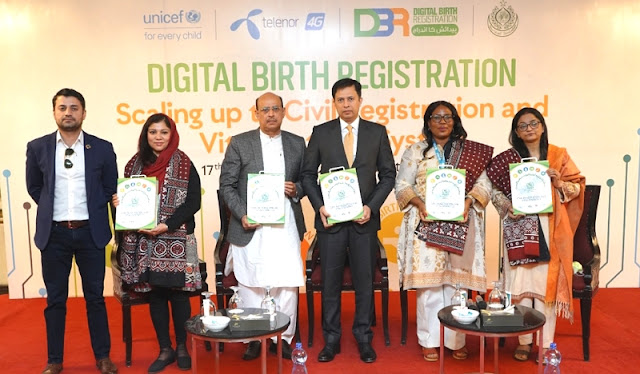Telenor Pakistan and UNICEF have handed over the Digital Birth Registration (DBR) system to the Sindh Government to scale it across the province
Leveraging innovation in technology, Telenor Pakistan and UNICEF have handed over the Digital Birth Registration (DBR) system to the Sindh Government to scale it across the province.
After its successful launch and implementation in 3 pilot districts, the local government in Sindh is now all set to take over the Digital Birth Registration project and scale it province-wide. The project transfer took place at an event in Karachi, attended by officials from Telenor Pakistan and UNICEF along with Sindh Government officials.
Designed with the goal of birth registration for kids under the age of 17, with a special focus on children under 5 years of age, the Digital Birth Registration system since its inception in 2016 has already helped recognize the identities of approximately 1.8 million children across Pakistan.
The DBR project ensures that every child gets their basic right of identity which would lead to giving them better access to education, healthcare, and basic human rights. Together, UNICEF and Telenor Pakistan have facilitated the creation of easy to access, convenient, and real-time mechanisms bringing birth registration to the doorstep in far-flung, hard to reach areas, thus, reducing the high opportunity cost and time incurred by the parents.
This successful public-private partnership model has shaped regional collaboration in technology and best-practice sharing for the achievement of universal birth registration for children across South Asia.
Commenting on the development, Irfan Wahab Khan, CEO Telenor Pakistan, said, “Birth registration is the fundamental right of every child and is a legal proof of their existence.”
“Every life registered through the DBR platform takes the nation another step closer to the fulfillment of the country’s development goals, and even more importantly, plays a vital role in mitigating the effects of inequalities and socio-economic disparities. Today, we are advancing towards the realization of an inclusive digital society faster than ever,” he added.
While speaking on the opportunity to scale the DBR system, he further stated, “Together with UNICEF, we are proud to have paved the way for our provincial government to do crucial work in uplifting and empowering communities across Pakistan.”
The 2030 Agenda for Sustainable Development is rooted in universal rights and inclusive development and is driven by the key principle of “leaving no one behind….” This is also embodied in target 16.9 of the Sustainable Development Goals which says: “By 2030, provide legal identity for all, including birth registration”.
“A birth registration certificate, as a legal document with proof of age, helps to prevent violations of the rights of the child, including such phenomena as child labor, the recruitment and use of child soldiers, early marriage, trafficking, and statelessness,” Commented Clara Dube, Chief Field Office Sindh.
“Birth registration is important for girl child for protection from the early marriage and the enforcement of laws that set a minimum age for marriage,” she added.
Present at the ceremony, Zainab Hussain Siddiqui, VP Sustainability and Partnerships at Telenor Group, said, “Digital Birth Registration started out as an idea of how we could use technology to give children their fundamental right to an identity. Today the project is set to take on a larger scale, helping more children access their right to a future.”
“This progress has been possible thanks to strong collaboration with our global partner UNICEF and the support and engagement of relevant government agencies. It is a great example of the positive impact we can create together by using technology for social good,” she added.
The upscaling of the DBR project shall ultimately contribute to universal birth registration for children in Pakistan, an obligation that Pakistan upholds under the Convention on the Rights of the Child (CRC) and the government’s commitment under the Asia Pacific Civil Registration and Vital Statistics (CRVS) Regional Action Framework.
The Digital Birth Registration project will also help Pakistan in fulfilling its commitment to fulfilling Sustainable Development Goals (16.9), particularly those relating to children.

